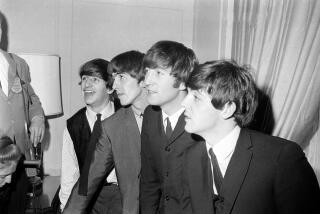POP MUSIC REVIEW : Britain’s Primitives Pull Their Punches
- Share via
It may have been a case of unrealistic expectations at the Roxy on Monday night.
The Primitives, a British band making its local debut, is part of an unusually large crop of promising rock groups that have surfaced this year.
The best moments in the Primitives’ first RCA album, “Lovely,” salute some of the most inviting strains in the melodic and invigorating pop-rock tradition. Among the wide-ranging and endearing touchstones: Phil Spector, Blondie, the Mamas and Papas, the Byrds, the Bangles and--for a recent touch of mystery--Jesus and Mary Chain.
While Primitives songs like the dizzy, exuberant “Crash”--a former No. 1 single in England--demonstrate the band’s ability to merge these rich influences into a knockout package, the strength of the music rests in the areas of subtlety and charm rather than originality or viewpoint.
It’s fun the way the band updates the classic sounds and the ease in which lead singer Tracey Tracey makes some of songwriter Paul Court’s teasing rhymes work. In “Spacehead,” Tracey Tracey makes an awkward rhyme sound as smooth as something by Cole Porter: “What is that boy on ?/He’s such a strange pers- on .”
Yet, the band fails on “Lovely” to make the songs add up to anything more than an interesting collection of pop exercises. Aside from the quaintness of construction, the tunes don’t give the band an identity or a direction.
This lack of definition is not uncommon with debut albums, but it puts pressure on the band to fill in some of the blanks on stage.
In recent months, two other members of the promising international crop of bands--Iceland’s Sugarcubes and Ireland’s Hothouse Flowers--have defined their somewhat shadowy album images with galvanizing shows at the Roxy. The Flowers, especially, reached out to the audience in a joyful sense of communion that further accentuated the idealistic strains in its debut LP.
Everything seemed in place at the Roxy for the Primitives to make a similar breakthrough. Rodney Bingenheimer, a local taste maker and deejay who has championed such predecessors as the Bangles and Blondie, was on hand to personally give his blessing.
The first glimpse of the Primitives was promising: Tracey Tracey, a tiny blonde dressed in upscale mod-’60s fashion, stood somewhat deadpan while surrounded by four scruffy-looking musicians.
It was a nice, if still ill-defined, piece of irony about the role of “girl singer” in pop music, especially in the ‘60s when most of the singers and girl groups were just puppets for male writers and producers.
But neither Tracey Tracey nor the band did anything with the imagery or irony. Her “reserve” as a performer and singer seemed, after a while, to be more a limitation than a strategy. And the rest of the band, including Court, didn’t help brighten things.
A bigger problem was the music. Instead of filling the songs with the bright, stimulating colors demonstrated on the record, the band gave almost everything a tougher edge. Rather than adding commentary to the songs, this simply made the music seem anonymous.
There were points, however, when the poppier elements of the music took hold. One was at the end when the band finally got around to “Crash.” At the first note, the males in the audience near the front of the stage began bounding about with an energy normally found at a punk show.
They not only collided, but climbed on each others backs. It was good that the band had a song that was so energetic and fun, but it was also a bad sign: It was more interesting to watch the audience than the punchless band.
In a way, that moment symbolized the disappointment of the evening. Where the Hothouse Flowers blossomed under live scrutiny, the Primitives seemed to all but wilt.
More to Read
The biggest entertainment stories
Get our big stories about Hollywood, film, television, music, arts, culture and more right in your inbox as soon as they publish.
You may occasionally receive promotional content from the Los Angeles Times.









